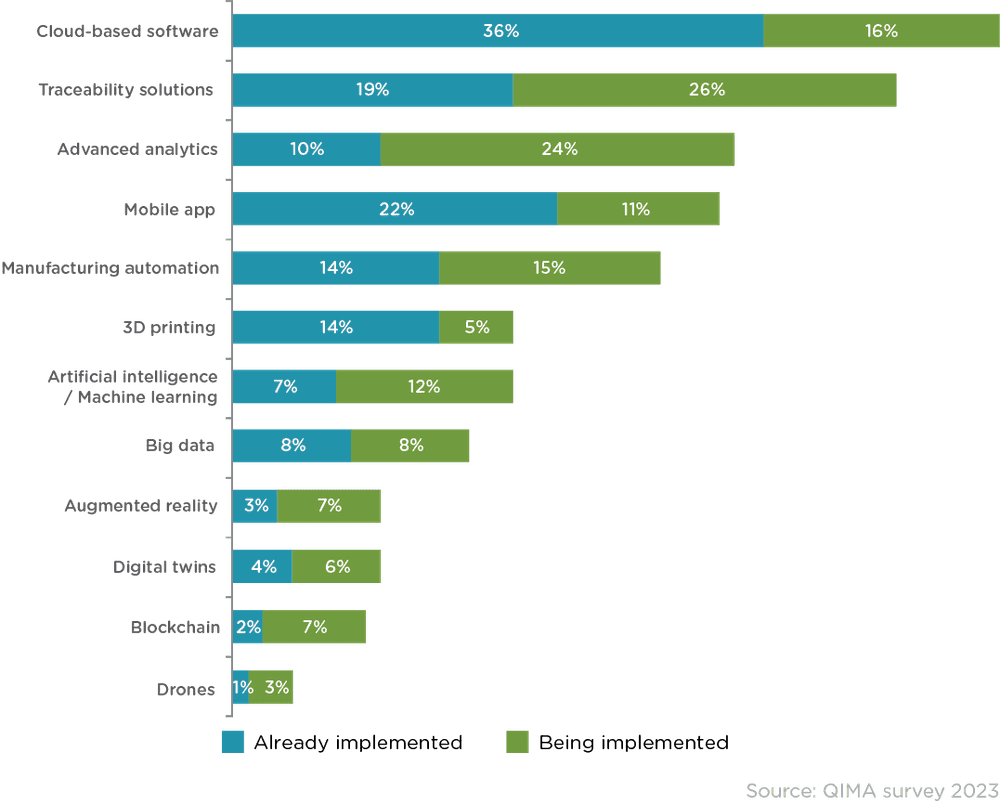
Tendencias de la Cadena de Suministro Digital: Casi la Mitad de las Empresas Están Implementando Tecnología de Trazabilidad en la Cadena de Suministro
En 2023, el uso de tecnología sigue dominando el ámbito de la gestión de la cadena de suministro. Las empresas están integrando cada vez más tecnologías de vanguardia, particularmente software basado en la nube, soluciones de trazabilidad y análisis avanzados, para mejorar la visibilidad y agilizar sus cadenas de suministro. Alrededor del 40% de las empresas que encuestó QIMA informaron que mejorar la trazabilidad fue una razón importante para invertir en la digitalización de la cadena de suministro. Este cambio tiene un impacto profundo, no solo transformando cómo operan las empresas sino también amplificando su rentabilidad.
Fig. 1. “¿Cuál de las siguientes tecnologías ha implementado su empresa o planea implementar en su cadena de suministro?”
Las soluciones de trazabilidad están entre las tres tecnologías de cadena de suministro más populares, junto con el software basado en la nube y los análisis avanzados. Esto muestra el creciente enfoque global en mejorar la visibilidad de la cadena de suministro a través de la tecnología.

La visibilidad de la cadena de suministro se menciona como la principal razón para la digitalización
En 2023, más que nunca, las empresas están señalando la visibilidad de la cadena de suministro como una razón principal para invertir en digitalización.
Entre las empresas que encuestamos, el 45% ya ha implementado o está en proceso de implementar soluciones de trazabilidad, situando a las soluciones de trazabilidad entre las tres tecnologías más populares. Estas soluciones ofrecen una poderosa herramienta para rastrear productos a medida que se desplazan a través de la cadena de suministro, permitiendo a las empresas asegurar calidad, cumplimiento y transparencia.
Liderando el cambio en la adopción de tecnología está el software basado en la nube, con un 52% de las empresas que ya lo han implementado o están en proceso de hacerlo. El software basado en la nube, una categoría amplia, optimiza la gestión de datos, permitiendo a las empresas acceder y compartir información crítica en tiempo real, promoviendo la colaboración y eficiencia.
Los análisis avanzados, en un cercano tercer lugar con 34%, permiten a las empresas aprovechar los datos para obtener ideas procesables. Esta tecnología ofrece la capacidad de tomar decisiones basadas en datos, optimizando operaciones y descubriendo oportunidades para ahorrar costos y mejorar procesos. En una era de generación de datos cada vez mayor, los análisis avanzados son un recurso vital para mantenerse competitivo en el mercado.
Estos hallazgos subrayan la creciente importancia de las soluciones digitales en la gestión de la cadena de suministro, proporcionando a las empresas los medios para mejorar la visibilidad, aumentar la eficiencia y, en última instancia, fortalecer su línea de fondo. A medida que la tecnología continúa avanzando, las empresas están adoptando estas herramientas para mantenerse a la vanguardia y satisfacer las demandas de un mercado en constante evolución.
En particular, la visibilidad de la cadena de suministro es un componente crucial para lograr el cumplimiento, especialmente en el contexto de la creciente legislación ESG (Ambiental, Social y de Gobernanza). Con regulaciones más estrictas que emergen globalmente, las empresas necesitan una vista clara de sus cadenas de suministro para asegurar el cumplimiento de los estándares ambientales, prácticas laborales justas y abastecimiento ético. Al aprovechar la tecnología y las soluciones basadas en datos para monitorear cada eslabón de la cadena de suministro, las organizaciones pueden identificar y abordar proactivamente posibles problemas de cumplimiento. Este esfuerzo refuerza el compromiso de las marcas con la sostenibilidad y las prácticas empresariales éticas en alineación con las requisitos ESG en evolución.
Figuras clave
La encuesta H1 de QIMA a más de 250 empresas muestra que:
El 45% de los encuestados están implementando herramientas tecnológicas diseñadas para mejorar la visibilidad de la cadena de suministro.
Las soluciones de trazabilidad están entre las tres tecnologías de cadena de suministro más populares.
El software basado en la nube es la tecnología más popular que las empresas están implementando, con más de la mitad de los encuestados indicando que ya han implementado o planean implementar la herramienta.
Leer el informe completo: Q3 2023 Barómetro
Related Articles


